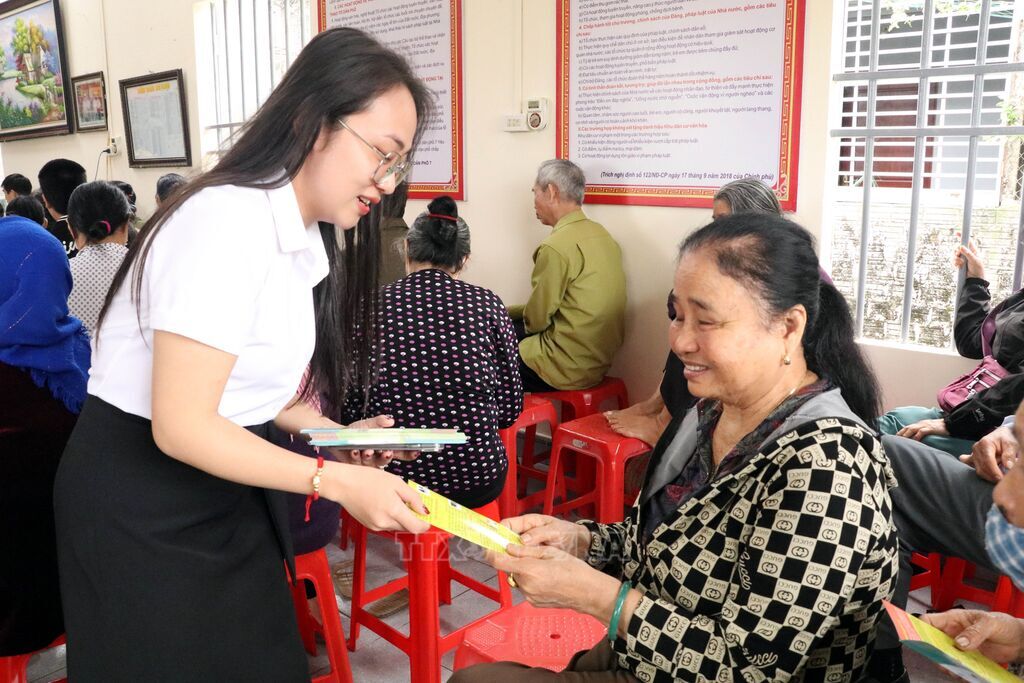 |
| An officer of Ninh Binh Province's Legal Aid Center distributes brochures to local residents to raise awareness about policies for people with disabilities__Photo: VNA |
As part of Vietnam’s judicial reform and institutional improvement, Resolution 66-NQ/TW of the Politburo sets out a clear direction: to study the establishment of a public lawyer institution and to develop conditional mechanisms allowing public employees to practice law. These are matters of strategic legal and social significance that require careful policy design to ensure legal effectiveness, practical viability, and policy coherence.
What is a public lawyer and how to design a suitable model for public lawyers?
A public lawyer is generally understood as a legal professional who provides legal services commissioned by the State to protect State interests while also representing disadvantaged individuals lacking access to legal support, thereby contributing to equitable social protection.
In Vietnam, the concept of “public lawyer” has not yet been formalized as an independent institution. A comparable structure exists in the form of legal aid officers working at State Legal Aid Centers. However, these officers primarily serve specific social policy beneficiaries under the Law on Legal Aid, and they lack the institutional mechanisms to defend State interests in complex legal disputes, particularly those involving international elements or public investment.
This reality highlights the need to establish and institutionalize the framework for public lawyers as a vital part of Vietnam’s legislative innovation and judicial reform, especially amid the country’s deepening regional and global economic integration.
In practice, many administrative cases, international disputes, and complex issues related to public assets and investment demand the involvement of legal experts with deep domestic and international expertise. Without a strong team of public lawyers, the State may face significant challenges in effectively defending its lawful rights and interests. This becomes increasingly urgent amid a rising number of administrative lawsuits and international investment disputes, where strong negotiation and litigation capacity is essential.
While affirming the indispensable role of public lawyers, legal experts have offered concrete proposals tailored to Vietnam’s conditions. According to Lawyer Hoang Van Huong of the Hanoi Bar Association, it is essential to define public lawyers as independent professionals, rather than integrating them as administrative units within the State apparatus. He argued that the State should be considered a “client” that commissions legal services from lawyers through specific contracts, rather than directly administering their work.
In an article published in Luật sư journal, Lawyer Huong also emphasized that there should be no separate qualification framework or training program for public lawyers. Since law is a liberal profession without a distinct procedural regime, all practitioners must meet the same requirements as stipulated in the Law on Lawyers. There should not be dual or parallel professional standards.
"Maintaining a unified standard for all lawyers—public or private—would uphold professionalism, transparency, and objectivity in legal services. Meanwhile, the model of State-commissioned legal services would allow public lawyers to operate independently, insulating them from administrative interference that could compromise effectiveness or integrity," he wrote.
Lawyer Nguyen Van Tuan from TGS Law Firm in Hanoi proposed piloting the public lawyer model at existing State Legal Aid Centers to assess its practical effectiveness before considering national expansion.
The lawyer, in an interview with Pháp luật newspaper, also underscored the need to revise and supplement two key legal documents—the Law on Lawyers and the Law on Legal Aid—or to develop a standalone law. Such legal reforms would define the legal status, functions, responsibilities, and operational mechanisms of public lawyers. Additionally, a stable financial framework is necessary to ensure adequate income and working conditions for full-time public lawyers.
Establishing a legal framework for public employees to practice law
The second reform initiative under Resolution 66 concerns the conditional authorization for public employees to practice law. This proposal, while promising, also presents significant regulatory and ethical challenges.
According to Lawyer Nguyen Thi Quynh Tho from Interla Law Firm, allowing public employees to practice law under Resolution 66 is a potentially transformative policy, but one that also brings considerable challenges. She emphasized that without strict regulatory provisions, conflicts of interest could arise, especially in cases where public functions and legal consulting activities are not clearly separated.
The “dual-role” model—where a person is a public employee and concurrently a practicing lawyer—risks undermining professional independence and objectivity. Lawyer Tho argued that restrictions or prohibitions must be established, and exceptions should only be allowed under strict supervision from both state management agencies and professional legal organizations.
Lawyer Nguyen Van Tuan called the policy a welcome reform that could tap into the high-quality human resources of the public sector. However, conditions must be imposed to ensure both feasibility and ethical compliance. These might include limiting legal practice to non-working hours, prohibiting involvement in matters related to the agency of the public employee-lawyer, and requiring strict adherence to professional ethics and dual oversight from the lawyer's agency and the relevant bar association.
He also offered several specific recommendations to strengthen the legal framework for public employees practicing law. First, the Law on Lawyers and the Law on Public Employees should be reviewed and amended to clarify permissible legal activities and prohibit tasks that pose conflict-of-interest risks. Second, a code of professional ethics tailored to public employees practicing law should be developed under the leadership of the Vietnam Bar Federation. Third, mechanisms for independent inspection and supervision should be enhanced through both administrative agencies and local bar associations. Finally, he suggested piloting a public lawyer model in which dedicated public legal professionals are trained to serve the public interest without participating in private legal practice, thus minimizing the potential for professional violations.- (VLLF)









